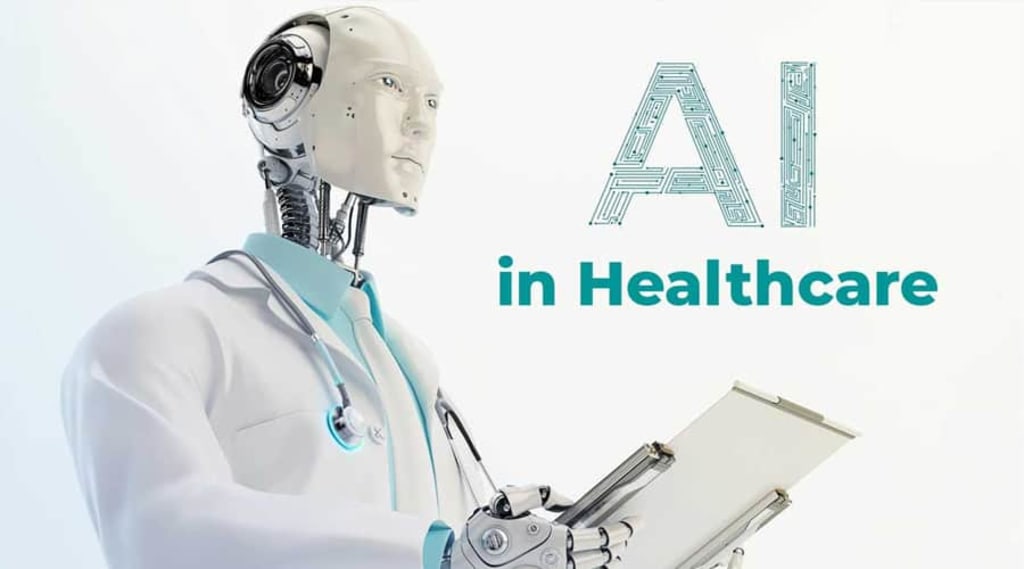AI in Healthcare
Artificial Intelligence (AI) in Healthcare Artificial intelligence (AI) is rapidly transforming the healthcare industry. AI-powered technologies are being used to improve patient care, reduce costs, and make healthcare more efficient.

Artificial Intelligence (AI) has emerged as a transformative force across various industries, and healthcare is no exception. With its ability to analyze vast amounts of data, recognize patterns, and make predictions, AI is revolutionizing the way healthcare professionals diagnose illnesses, develop treatment plans, and provide personalized patient care. In this article, we will explore the profound impact of AI in healthcare and its potential to improve outcomes and enhance the overall patient experience.
Enhanced Diagnostic Accuracy:
Accurate and timely diagnosis is crucial for effective treatment. AI algorithms can analyze medical imaging scans, such as X-rays, MRIs, and CT scans, with remarkable precision. These algorithms can detect subtle abnormalities, compare images to extensive databases, and assist radiologists in identifying potential diseases or conditions. By reducing the risk of human error and enabling earlier detection, AI enhances diagnostic accuracy, leading to improved patient outcomes.
Predictive Analytics:
AI algorithms can analyze vast amounts of patient data, including electronic health records (EHRs), genetic information, and lifestyle factors, to identify patterns and make predictions. By identifying risk factors, AI can help healthcare providers develop proactive strategies to prevent diseases or intervene at an early stage. For instance, AI-powered models can predict the likelihood of a patient developing conditions like diabetes, cardiovascular diseases, or certain types of cancer. This empowers healthcare professionals to offer personalized interventions and lifestyle modifications tailored to individual patients, thus promoting better health management.
Precision Medicine:
Every patient is unique, and their response to treatments can vary. AI is enabling the development of precision medicine, which aims to provide personalized treatment plans based on an individual's genetic makeup, medical history, and lifestyle factors. By analyzing genetic data, AI algorithms can identify specific biomarkers associated with diseases and predict which treatments are most likely to be effective. This not only optimizes treatment outcomes but also minimizes adverse effects and reduces healthcare costs.
Streamlining Administrative Tasks:
Administrative tasks, such as appointment scheduling, billing, and documentation, can be time-consuming for healthcare professionals, taking away valuable time that could be spent on patient care. AI-powered chatbots and virtual assistants can automate these tasks, improving efficiency and reducing administrative burden. By leveraging natural language processing and machine learning, these AI systems can provide instant responses to patient queries, offer appointment reminders, and assist with paperwork, freeing up healthcare providers to focus on direct patient interactions.
Remote Patient Monitoring:
With the advancement of wearable devices and IoT technologies, AI is facilitating remote patient monitoring, enabling healthcare providers to monitor patients' vital signs, activity levels, and adherence to treatment plans remotely. AI algorithms can analyze the collected data in real-time, detecting anomalies and alerting healthcare professionals in case of emergencies or deviations from normal health parameters. This technology is particularly valuable for managing chronic conditions and providing continuous care to patients in remote areas.
Augmented Decision-Making:
AI-powered decision support systems are assisting healthcare professionals in making well-informed decisions. By analyzing medical literature, clinical guidelines, and patient data, AI algorithms can provide evidence-based recommendations for treatment plans, medication options, and surgical procedures. These systems act as valuable tools, complementing the expertise of healthcare providers and reducing the risk of errors or oversights. Augmented decision-making through AI fosters collaboration between technology and human intelligence, leading to better patient outcomes.
Improved Patient Safety:
Patient safety is a paramount concern in healthcare. AI applications contribute to enhancing patient safety by identifying potential adverse events, medication errors, and complications. AI algorithms can analyze patient data in real-time, flagging any abnormalities or deviations from expected outcomes. This enables early intervention and preventive measures, reducing the risk of medical errors and improving patient safety. Additionally, AI can assist in the identification of high-risk patients who may require extra attention or interventions to prevent adverse events.
Efficient Clinical Trials:
Developing new treatments and conducting clinical trials is a time-consuming and costly process. AI is playing a significant role in streamlining and accelerating this process. AI algorithms can analyze vast amounts of research data, identifying potential drug candidates, predicting their efficacy, and identifying suitable patient populations for clinical trials. By optimizing trial design and participant selection, AI expedites the development of innovative treatments, leading to faster access to effective therapies for patients in need.
Ethical Considerations and Data Privacy:
While the potential of AI in healthcare is immense, it is crucial to address ethical considerations and ensure the protection of patient data privacy. Safeguarding patient information, ensuring data security, and maintaining transparency in AI algorithms are vital to build trust among patients and healthcare professionals. Striking the right balance between data utilization for AI advancements and safeguarding individual privacy rights is a critical challenge that needs careful attention.
Continuous Learning and Adaptability:
One of the unique features of AI is its ability to continuously learn and adapt. As more data is generated and new insights are discovered, AI algorithms can continuously improve their performance. By analyzing outcomes, learning from mistakes, and integrating new research findings, AI systems become more accurate and efficient over time. This adaptability holds immense promise for healthcare, as it enables the integration of the latest knowledge and advancements into clinical practice, ultimately benefiting patients.
Conclusion:
Artificial Intelligence is reshaping healthcare by revolutionizing diagnosis, treatment, and patient care while improving efficiency and patient safety. From augmented decision-making to facilitating clinical trials and ensuring data privacy, the transformative power of AI is evident. By embracing the potential of AI while addressing ethical considerations and privacy concerns, healthcare professionals can harness its capabilities to provide personalized, effective, and patient-centered care. As AI continues to advance, its impact on healthcare is poised to be even more profound, opening new frontiers in medical innovation and improving health outcomes for individuals worldwide.





Comments
There are no comments for this story
Be the first to respond and start the conversation.